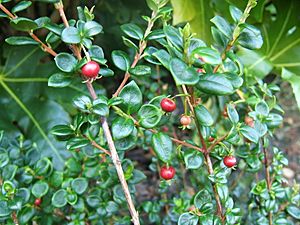Chilean guava berry facts for kids
Quick facts for kids Chilean guava berry |
|
|---|---|
 |
|
| Scientific classification | |
| Genus: |
Ugni
|
| Species: |
molinae
|
| Synonyms | |
|
|
The Ugni molinae is a special plant often called the Chilean guava berry or strawberry myrtle. It is a shrub that grows naturally in Chile and parts of southern Argentina. Local people in Chile call it murta. The Mapuche Native American people call it "Uñi" or Uñiberry. This plant belongs to the same plant family as the well-known guava fruit.
Sometimes, you might see its fruit sold as "Ugniberry". In New Zealand, it's called "New Zealand cranberry". In Australia, the name "Tazziberry" is used. However, it's important to remember that this plant is not originally from New Zealand or Australia.
Contents
What Does Ugni molinae Look Like?
The Ugni molinae is a shrub that usually grows between 30 centimeters and 170 centimeters tall. Sometimes, it can even reach up to 3 meters in height! It has evergreen leaves, which means they stay green all year round.
Leaves, Flowers, and Fruit
Its leaves grow opposite each other on the stem. They are oval-shaped, about 1 to 2 centimeters long and 1 to 1.5 centimeters wide. The leaves are shiny and dark green. If you crush them, they have a nice, spicy smell.
The flowers hang down and are about 1 centimeter wide. They have four or five white or light pink petals. Inside, there are many short stamens, which are the parts that hold pollen.
The fruit is a small berry, about 1 centimeter across. It can be red, white, or purple. In its natural home, the Valdivian temperate rain forests, the fruit ripens in autumn, usually from March to May.
The Story of Ugni molinae
The Ugni molinae was first described in 1782 by a person named Juan Ignacio Molina. This is why the plant's scientific name includes "molinae."
From Chile to England
In 1844, a botanist and plant collector named William Lobb brought this plant to England. It quickly became very popular there. In fact, it was a favorite fruit of Queen Victoria herself! Today, people also grow it as an ornamental plant, which means it's grown for its beauty in gardens.
Spreading to New Places
Before 1896, the Ugni molinae was brought to Robinson Crusoe Island. On this island, it started to grow very quickly. It became an invasive species, meaning it spread widely and formed thick bushes. This can sometimes cause problems for other plants that are native to the island.
How People Use the Fruit
The fruit of the Ugni molinae is grown on a small scale. It is mostly used in southern Chile, where it grows naturally. It is also grown for sale in New Zealand.
People use the fruit to make a traditional liqueur called Murtado. This drink is made with a spirit called aguardiente and sugar, flavored by keeping the murtas inside the bottle. The fruit is also used to make delicious jam. You can also find it in a dessert called murta con membrillo and in a type of cake called Kuchen.
See also
- Myrcianthes coquimbensis
- Myrteola nummularia
- Myrceugenia obtusa
- Empetrum rubrum
- Aristotelia chilensis
- Austromyrtus dulcis

